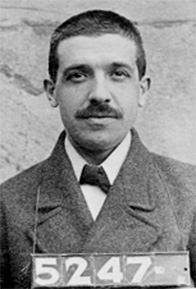Ponzi
| Charles Ponzi | |
|---|---|

Charles Ponzi aka "Charles Bianchi" under arrest circa 1910
|
|
| Born |
Carlo Pietro Giovanni Guglielmo Tebaldo Ponzi March 3, 1882 Lugo, Emilia-Romagna, Italy |
| Died | January 18, 1949 (aged 66) Rio de Janeiro, Brazil |
| Nationality | Italian |
| Other names | Charles Ponci, Carlo and Charles P. Bianchi |
| Occupation | Financier, confidence trickster |
| Known for | Ponzi scheme |
| Criminal charge | Forgery (Canada), mail fraud (federal), larceny (state) |
| Criminal penalty | 3 years in Canada 1908–1911; 5 years federal (served 3 and half years before facing state charge) 1920–1922; 9 years state 1927–1934; deportation in 1934 |
| Spouse(s) | Rose Gnecco (1918–1937, divorced) |
| Parent(s) | Oreste and Imelde Ponzi |
| Motive | Financial gain |
Charles Ponzi, born Carlo Ponzi (March 3, 1882 – January 18, 1949), was an Italian swindler and con artist in the U.S. and Canada. His aliases include Charles Ponci, Carlo, and Charles P. Bianchi. Born and raised in Italy, he became known in the early 1920s as a swindler in North America for his money-making scheme. He promised clients a 50% profit within 45 days, or 100% profit within 90 days, by buying discounted postal reply coupons in other countries and redeeming them at face value in the United States as a form of arbitrage. In reality, Ponzi was paying early investors using the investments of later investors. While this swindle predated Ponzi by several years, it became so identified with him that it now bears his name. His scheme ran for over a year before it collapsed, costing his "investors" $20 million.
Ponzi may have been inspired by the scheme of William F. Miller, a Brooklyn bookkeeper who in 1899 used the same scheme to take in $1 million. In addition, "The Man Who Broke the Bank at Monte Carlo", Charles Deville Wells, had operated a very similar scheme in France in 1910-11, when—under the alias ″Lucien Rivier″—he had set up a phony bank, to the detriment of his 6,000 victims.
Charles Ponzi was born Carlo Pietro Giovanni Guglielmo Tebaldo Ponzi in Lugo, Italy, in 1882. He told The New York Times that he had come from a family in Parma, Italy. His ancestors had been well to do, and his mother continued to use the title "Dona", but the family had subsequently fallen upon bad days and had little money. He took a job as a postal worker early on, but soon was accepted into the University of Rome La Sapienza. His richer friends considered the university a "four-year vacation," and he was inclined to follow them around to bars, cafés, and the opera. This resulted in Ponzi spending off all his money and four years later, he was left broke and without a degree. During this time, a number of Italian boys were migrating to the United States and returning to Italy as rich people. Ponzi's family encouraged him to do the same thereby returning his family to its lost glory.
...
Wikipedia
